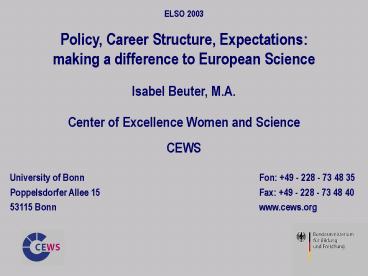PowerPointPrsentation - PowerPoint PPT Presentation
1 / 14
Title:
PowerPointPrsentation
Description:
University of Bonn Fon: 49 - 228 - 73 48 35. Poppelsdorfer ... Marie Sklodowska Curie (2x), Marie Goeppert Mayer. Irene Joliot-Curie, Dorothy Crowfoot Hodgkin ... – PowerPoint PPT presentation
Number of Views:27
Avg rating:3.0/5.0
Title: PowerPointPrsentation
1
ELSO 2003 Policy, Career Structure, Expectations
making a difference to European Science Isabel
Beuter, M.A. Center of Excellence Women and
Science CEWS University of Bonn Fon 49 - 228
- 73 48 35 Poppelsdorfer Allee 15 Fax 49 - 228
- 73 48 40 53115 Bonn www.cews.org
2
- Structure
- I About CEWS
- II Facts Figures
- Leaky Pipeline and Glass Ceiling
- III Individual and organisational approach
- IV What can be done?
3
- Center of Excellence Women and Science CEWS
- CEWS is an information, service and coordination
centre - and advisory office set up in 2000 with three
main objectives - Increasing the proportion of women in executive
positions in science and research - Increasing the efficiency of measures for equal
opportunities at universities, research
institutions and in industry - Implementing gender mainstreaming in science
and research
4
- Facts Figures Role Models
- By 2003 only 10 women had received a Nobel Prize
in physics, chemistry or physiology medicine - Marie Sklodowska Curie (2x), Marie Goeppert
Mayer - Irene Joliot-Curie, Dorothy Crowfoot Hodgkin
- Gerty Radnitz Cori, Rosalyn Sussmann Yalow,
Barbara - McClintock, Rita Levi-Montalcini, Gertrude
Elion, Christiane Nuesslein-Volhard
5
- Facts and Figures
- Leaky Pipeline / Glass Ceiling
- decreasing proportion of women
- (German data for 2003)
- Full professors
- Habilitation
- PhD
- Graduates
- First year students
12,6 22,0 37,9 48,4 48,2
6
- Facts and Figures
- Leaky Pipeline / Glass Ceiling turned upside
down - increasing proportion of men
- (German data for 2003)
- Full professors
- Habilitation
- PhD
- Graduates
- First year students
87,4 78,0 62,1 51,6 51,8
7
- Facts and Figures
- Figures vary across Europe and across
scientific fields - Glass Ceiling also known in business sector
with few top management positions held by women
8
- Problems faced by women
- Two main approaches
- Individual based
- Focus on female scientists background,
behaviour and - personality
- Organisational based
- Focus on excluding mechanisms of organisations
and their formal and informal rules
9
- Outcomes with regard to individual based
variables - Biography and Living Situation
- Female academics are more likely to have an
academic family background - Female academics are more likely to remain
childless and live as singles - Career Development
- Career progress is slower and less determined
- Tendency to ascribe success to fortunate
circumstances
10
- Outcomes with regard to individual based
variables - Motivation
- Subtle differences in professional motivation
- Women put more emphasis on subject matter than
on position status - Tendency to avoid highly competitive situations
11
- Outcomes regarding organisational based variables
- Myths and Male Substructure
- Belief of academia and research as most
challenging professions requiring unconditional
commitment and unlimited availability - Conceived structural incompatibility of
femininity and academia and research - Structural Discrimination
- Exclusion of reputation building networks
- Missing role models / mentors
12
- Turning 30
- The time around 30 is when
- (Academic) women might want to have children
- Parents are getting older
- The PostDoc phase begins
- Running independent groups should start
- Missing support concerning childcare and
flexible working hours / part-time work becomes
an issue - Dual careers are getting even harder to juggle
13
- What can be done?
- Networking
- Mentoring
- Database of female scientists
- Tackle the question of academic vs. biological
age
14
Thanks! For more information please
contact Center of Excellence Women and Science
CEWS www.cews.org info_at_cews.uni-bonn.de
University of Bonn Poppelsdorfer Allee 15
Fon 49 - 228 - 73 48 35 53115 Bonn
Fax 49 - 228 - 73 48 40































